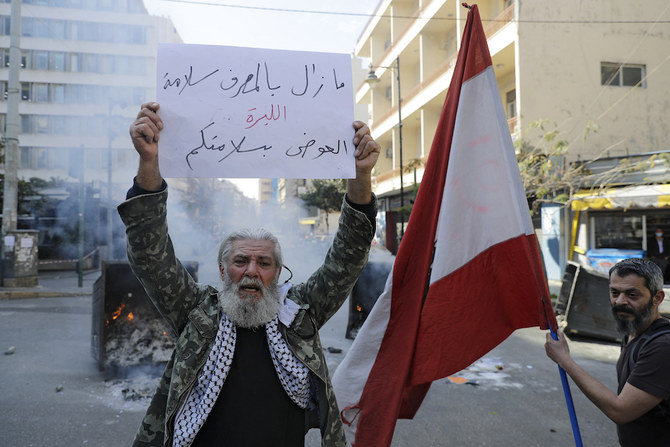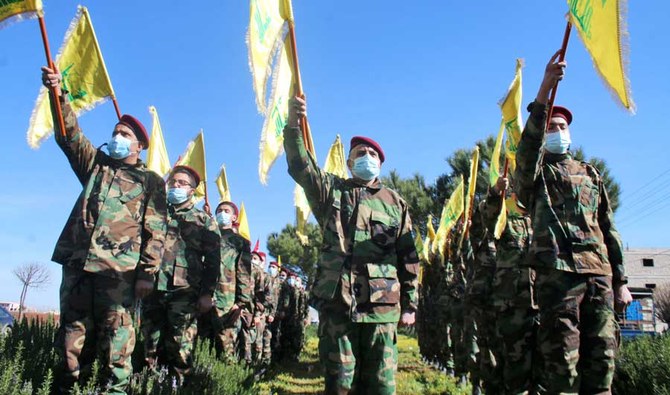
By CORNELIA MEYER -- Arabnews.com -- LONDON: Over the past two weeks the Lebanese pound has lost more than 20 percent of its value against the dollar on the black market. Since October 2019 the exchange rate has plummeted by 90 percent, affecting everyone in the country. These numbers are stark. On March 16 three money changers told the AFP news agency they were buying dollars for 14,800 to 14,900 Lebanese pounds. The currency is pegged to the dollar and the official rate is set at 1,507.5 pounds to one dollar. However, dollars are generally unavailable at the official rate because of the economic crisis, which is why black-market rates apply. In 2020, Lebanon was the fourth most-indebted country in the world behind Japan, Greece and Eritrea. In March last year, the country defaulted on its international debt for the first time in its history. Since then, there have been no economic reforms and no payment plans agreed.
The situation is exacerbated by the banking crisis and the effects of the pandemic. The nation’s banks face bankruptcy, having lent up to 70 percent of their assets to an insolvent state and central bank. The country has lost its creditworthiness and is resorting to printing more, increasingly worthless, money which is further fueling inflation. The depreciation of the pound resulted in staggering inflation of 84 percent in 2020. To make matters worse, food inflation stood at 402 percent. Meanwhile Lebanon’s gross domestic product contracted by 25 percent last year. The World Bank estimates that 50 percent of Lebanon’s population has slipped below the poverty line, which is mind-boggling in a country that 60 years ago was known as the “Switzerland of the Middle East.” The economic situation is worse now than it was during the civil war in the 1970s and 1980s. What we see in Lebanon is a classic vicious circle: the worse the economy gets, the more the currency depreciates and vice versa. The numbers reflect a defunct economy.

By NAJIA HOUSSARI -- arabnews.com -- BEIRUT: Hezbollah has walked away from a previous agreement to form a Lebanese government of nonpolitical specialists, claiming that any leadership not backed by political forces “will go down in a week or two.” The militant party’s change of tack has shattered hopes that an 18th meeting between President Michel Aoun and Prime Minister-designate Saad Hariri scheduled for next Monday would end the long-running stalemate over the formation of the government. Hezbollah leader Hassan Nasrallah’s comments, made in a televised address on Thursday, also undermine French efforts launched by President Emmanuel Macron to form a government free of political forces in order to gain the confidence of the international community and help Lebanon recover from its crippling economic and health crisis. Mustafa Alloush, a leading figure in Hariri’s Future Movement, said: “There is a chance to agree on the formation of the government on Monday, but Hariri has no intention of bringing back a political government because it will inevitably fail, based on previous experience.”
Aoun remained firm in his demands for a government of 20 ministers with the blocking third, while Hariri seeks a government of 18 specialists. The disagreement between the two escalated on Wednesday after an exchange of statements, with Aoun calling on Hariri to step down if is unable to form a government. Hariri responded by asking Aoun to set a date for early presidential elections. Hopes that Monday’s meeting could end the political impasse lifted the Lebanese pound to 11,500 against the US dollar after it had earlier exceeded 15,000 on the black market. However, the currency lost value again on Friday after Nasrallah’s address. In his speech, the Hezbollah chief criticized the International Monetary Fund, on which Lebanon relies for assistance, and attacked calls for Lebanon’s neutrality, saying that these were part of efforts to include the country in the “US-Israeli axis in the region.” Nasrallah also targeted the policies of Lebanese central bank Gov. Riad Salameh, warning him of the need to improve the dollar exchange rate.
The Daily Star — BEIRUT: The Lebanese pound rose on the black market Thursday, trading at LL11,950 against the dollar, on reports …
BEIRUT (AP) — Lebanon’s prime minister-designate said Thursday that a government that could restart talks with the International Monetary Fund was the …
Khazen History


Historical Feature:
Churches and Monasteries of the Khazen family

St. Anthony of Padua Church in Ballouneh
Mar Abda Church in Bakaatit Kanaan
Saint Michael Church in Bkaatouta
Saint Therese Church in Qolayaat
Saint Simeon Stylites (مار سمعان العامودي) Church In Ajaltoun
Virgin Mary Church (سيدة المعونات) in Sheilé
Assumption of Mary Church in Ballouneh
1 - The sword of the Maronite Prince
2 - LES KHAZEN CONSULS DE FRANCE
3 - LES MARONITES & LES KHAZEN
4 - LES MAAN & LES KHAZEN
5 - ORIGINE DE LA FAMILLE
Population Movements to Keserwan - The Khazens and The Maans
ما جاء عن الثورة في المقاطعة الكسروانية
ثورة أهالي كسروان على المشايخ الخوازنة وأسبابها
Origins of the "Prince of Maronite" Title
Growing diversity: the Khazin sheiks and the clergy in the first decades of the 18th century
Historical Members:
Barbar Beik El Khazen [English]
Patriach Toubia Kaiss El Khazen(Biography & Life Part1 Part2) (Arabic)
Patriach Youssef Dargham El Khazen (Cont'd)
Cheikh Bishara Jafal El Khazen
Patriarch Youssef Raji El Khazen
The Martyrs Cheikh Philippe & Cheikh Farid El Khazen
Cheikh Nawfal El Khazen (Consul De France)
Cheikh Hossun El Khazen (Consul De France)
Cheikh Abou-Nawfal El Khazen (Consul De France)
Cheikh Francis Abee Nader & his son Yousef
Cheikh Abou-Kanso El Khazen (Consul De France)
Cheikh Abou Nader El Khazen
Cheikh Chafic El Khazen
Cheikh Keserwan El Khazen
Cheikh Serhal El Khazen [English]
Cheikh Rafiq El Khazen [English]
Cheikh Hanna El Khazen
Cheikha Arzi El Khazen
Marie El Khazen